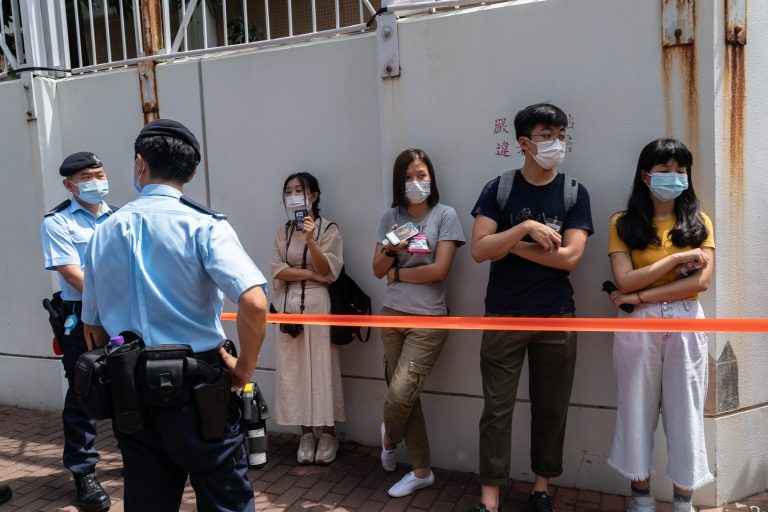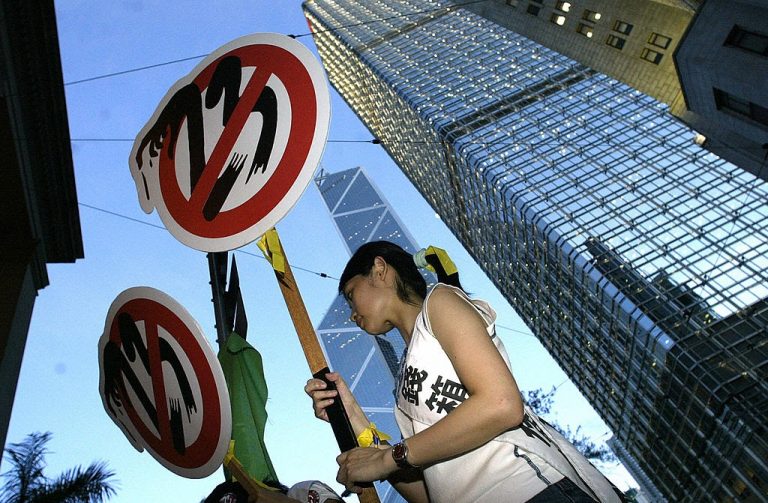More than a year after Hong Kong imposed the National Security Law (NSL), the city continues to see an exodus of residents, particularly well-educated professionals.
According to data from the Hong Kong census and statistics department, the mid-year population in 2021 stood at 7,394,700, a decrease of 87,100 people from the same period last year and the biggest decline the city has seen since 1961. As to why there was a decline in population, the answer lies in the net outflow data.
In the one-year period between June 2020 and June 2021, Hong Kong registered a net outflow of 89,200 people, which is four times higher than the 20,900 outflow recorded during the June 2019 to June 2020 period.
The National Security Law, which allows the government to crack down on pro-democracy and human rights activists on the pretext of subversion, foreign collusion, etc., came into effect on June 20, 2020. It heavily suppresses free speech, acting against those who criticize the Chinese Communist Party’s ideologies and policies.
On Wednesday, Sept. 8, the Hong Kong government arrested four members of the Hong Kong Alliance in Support of Patriotic Democratic Movements of China, which for the three decades had organized popular annual demonstrations to commemorate the 1989 Beijing Tiananmen Massacre. One of those arrested was the group’s vice head, lawyer Chow Hang-tung.
Success
You are now signed up for our newsletter
Success
Check your email to complete sign up
Officials from Hong Kong and mainland China have tried to downplay the exodus of professionals. However, Chinese state-backed media CRNTT recently acknowledged that a large number of highly skilled Hongkongers leaving the country was a problem.
In an Aug. 30 report, it said that the exodus was linked to the passage of NSL. “There is a high proportion of professionals — 12 percent — among those emigrating… The Hong Kong government should pay close attention to the increase in the number of professionals emigrating, and set out a long-term response strategy,” the report stated.
CRNTT expressed serious concerns over the loss of healthcare professionals, recommending the administration to focus on hiring healthcare workers from the mainland and other countries. Earlier, Hong Kong’s Hospital Authority (HA) had admitted that the region had lost 4.6 percent of doctors and 6.5 percent of nurses from public hospitals. HA Chairman Henry Fan called the situation in public hospitals “worrying,” adding that the exodus was also affecting private hospitals.
Hong Kong no longer ‘suitable for living’
In an interview with The Washington Post, 32-year-old Cheung, who left Hong Kong, stated that he had already started planning his escape when authorities began cracking down on pro-democracy protestors in 2019. And when the National Security Law was implemented, it “triple confirmed” his decision.
“Originally, we had some hope that 2 million people protesting on the streets could be a starting point for Hong Kong to become better,” Cheung said. However, the reaction of the government showed that it did not stand with the people. The city is “not suitable for living, in every aspect, be it politics, the economy or social policies,” he added.
The exodus has also resulted in an outflow of wealth. According to data from Hong Kong’s Mandatory Provident Fund system, the total value of withdrawals reached around $250 million separately in two succeeding quarters – Q4, 2020 and Q1, 2021. Those who withdraw their retirement savings on departure are required to sign a declaration stating that they do not plan on coming back, either to live or work in Hong Kong permanently.
One of the top destinations of emigrating Hongkongers is the United Kingdom that offers a path to citizenship for holders of BN(O) passports. London expects around 300,000 Hongkongers to move into the country over a five-year period, which, if turns out to be true, will be one of the biggest waves of migration into the UK.
According to a survey, 41 percent of companies in Hong Kong experienced a surge in the percentage of employees resigning from their jobs in the first half of this year. Hong Kong’s Financial Services Development Council warned that many families were planning to relocate in search of better education for their kids.
In an interview with Nikkei Asia, Paul Yip, an expert on population issues, stated that the number of people leaving Hong Kong has become “quite serious.”
“The peak of emigration will be at the end of this year or next year, as it takes six months to a year for people to get ready to move… If the increasing emigration trend doesn’t continue, the impact on the working population might not be significant. But if it continues, that would become a serious concern,” Yip said.













